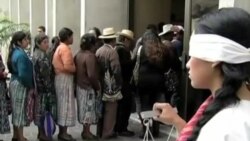The continuing legal complications that threaten to annul the Guatemalan trial of a former military dictator have brought renewed attention to the difficulties of prosecuting high-profile human rights cases in developing countries. The genocide trial of former Guatemalan dictator General Efrain Rios Montt was greeted as a major step forward in accountability when it opened earlier this year, but its procedural problems have led to frustrations.
Chanting “justice, justice,” protesters in Guatemala City reacted angrily to the suspension of the trial earlier this month.
The protesters, mainly indigenous people, want the 86-year-old former dictator punished for the massacres of Mayan Indians during the early 1980’s that were part of a US-backed “scorched earth” campaign against leftist guerrillas.
Brutal conflict
An estimated 200,000 people were killed in the 36-year conflict that ended in 1996, most of them victims of Guatemala’s security forces.
General Rios Montt seized power in a 1982 coup and presided over the bloodiest period of the war during his 17-month rule.
Jose Miguel Vivanco heads the Americas program at Human Rights Watch. “The military tactics that he used during that period were clearly in violation of the basic standards of humanitarian law by not making any effort in distinguishing combatants from the civilian population,” he said.
Montt went on trial in March on charges of genocide for allegedly targeting an entire Mayan community in the country’s highlands in a campaign to wipe out support for leftist rebels.
At least 17-hundred people were killed, according to prosecutors and witnesses.
As the Rios Montt trial drew to a close, it was suspended over procedural issues that could annul the process. Defense lawyers, who argued the general did not order the killings, welcomed the move.
“It's a very important precedent for the country in an important case such as this one," said defense lawyer Danilo Rodriguez.
Furthering human rights initiatives
But others say the maneuvering reflects the difficulties in prosecuting human rights violations in countries like Guatemala, where judicial institutions are subject to pressure.
Via Skype, international law expert Paul Seils said, "What we have at this point are the forces who are basically saying: ‘We will not be subjected to the rule of the law in the country. The rules of the country are for other people. We will not accept a statement that we were involved in genocide or crimes against humanity.'"
Despite the legal limbo, putting the ex-dictator on trial was unprecedented, the first time a former head of state has been tried for genocide by his own country’s legal system.
“To go after somebody who has been the quintessential representation of unlimited power, such as Rios Montt, and to charge him with human rights abuses, but not just any rights abuses, but with genocide, reveals tremendous courage but also some important change that the society has been going through,” said Jose Miguel Vivanco of Human Rights Watch.
The U.S. State Department calls the trial “historic," and Friday urged Guatemala to ensure this case fulfills its domestic and international legal obligations. It also dispatched a top official to Guatemala City to consult about the judicial process.
Chanting “justice, justice,” protesters in Guatemala City reacted angrily to the suspension of the trial earlier this month.
The protesters, mainly indigenous people, want the 86-year-old former dictator punished for the massacres of Mayan Indians during the early 1980’s that were part of a US-backed “scorched earth” campaign against leftist guerrillas.
Brutal conflict
An estimated 200,000 people were killed in the 36-year conflict that ended in 1996, most of them victims of Guatemala’s security forces.
General Rios Montt seized power in a 1982 coup and presided over the bloodiest period of the war during his 17-month rule.
Jose Miguel Vivanco heads the Americas program at Human Rights Watch. “The military tactics that he used during that period were clearly in violation of the basic standards of humanitarian law by not making any effort in distinguishing combatants from the civilian population,” he said.
Montt went on trial in March on charges of genocide for allegedly targeting an entire Mayan community in the country’s highlands in a campaign to wipe out support for leftist rebels.
At least 17-hundred people were killed, according to prosecutors and witnesses.
As the Rios Montt trial drew to a close, it was suspended over procedural issues that could annul the process. Defense lawyers, who argued the general did not order the killings, welcomed the move.
“It's a very important precedent for the country in an important case such as this one," said defense lawyer Danilo Rodriguez.
Furthering human rights initiatives
But others say the maneuvering reflects the difficulties in prosecuting human rights violations in countries like Guatemala, where judicial institutions are subject to pressure.
Via Skype, international law expert Paul Seils said, "What we have at this point are the forces who are basically saying: ‘We will not be subjected to the rule of the law in the country. The rules of the country are for other people. We will not accept a statement that we were involved in genocide or crimes against humanity.'"
Despite the legal limbo, putting the ex-dictator on trial was unprecedented, the first time a former head of state has been tried for genocide by his own country’s legal system.
“To go after somebody who has been the quintessential representation of unlimited power, such as Rios Montt, and to charge him with human rights abuses, but not just any rights abuses, but with genocide, reveals tremendous courage but also some important change that the society has been going through,” said Jose Miguel Vivanco of Human Rights Watch.
The U.S. State Department calls the trial “historic," and Friday urged Guatemala to ensure this case fulfills its domestic and international legal obligations. It also dispatched a top official to Guatemala City to consult about the judicial process.





